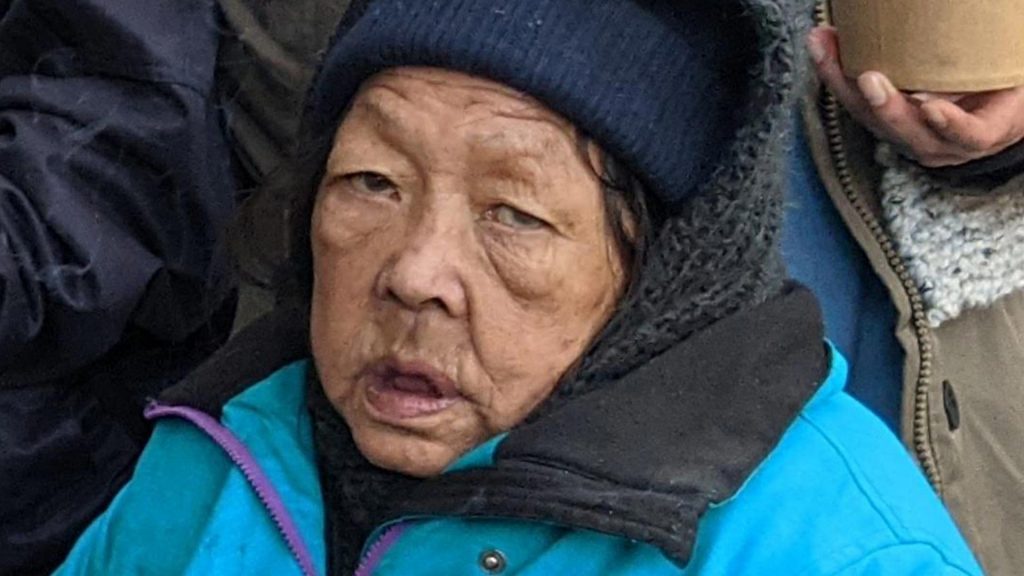
Inuk Elder Elisapie Pootoogook was found near a construction site in Montreal over the weekend. Photo courtesy: David Chapman.
Elisapie Pootoogook reportedly spent her last days playing a game of “cat and mouse” with metro security agents near the downtown Montreal drop-in shelter she often frequented, according to those who knew her.
“This was known at least a few days before her death,” explained David Chapman, executive director of Resilience Montreal. “She’d be in the metro, she’d see the security coming and she’d come out into the park for a bit. The security would move on, so she’d go back into the metro – and that pattern would continue.
“Well, at one point it appears she went a little further than the park.”
Around 8:30 a.m. on Saturday, Montreal police were alerted to the discovery of a woman’s body near the construction site of a luxury condo complex across from Cabot Square, a well-known hub for the city’s urban Indigenous population.
The woman was later identified by shelter workers as Pootoogook, 61, from Kinngait, formerly known as Cape Dorset in Nunavut.
A Montreal police spokesperson told APTN News they don’t suspect foul play, but the file has since been transferred to the Quebec coroner’s bureau for an autopsy to determine the exact cause of death.

Chapman worked directly with Pootoogook over the last seven years.
Though he describes her as “frail” with persistent mobility issues, Chapman says Pootoogook was a “lovely” woman who, when excited, was known for exclaiming “oh my stars!”
“She had a real personality to her. I remember she’d use my phone often, and she would call her family members in the north,” Chapman explained.
“She would be singing lullabies to her grandkids on my phone, while panhandling in the metro – and it was quite something.”
Life, however, was not easy for Elisapie.
Though she had returned home to the North several times, Chapman says her situation was complicated by frequent travel south for medical treatment.
“In some ways, she was kind of caught between two worlds,” he said.
APTN has also confirmed that Pootoogook is the older sister of the late artist Annie Poogoogook, who was recently honoured through a park renaming ceremony in Ottawa.
Annie Poogoogook was only 47 when she died in September 2016. Though her body was found in the Rideau River in the city’s east end, police were quick to rule the death “accidental.”
It was later changed to suspicious but no one has been arrested in relation to her death.
Though Chapman wasn’t aware of this family connection, he says a “not in my backyard” attitude is hindering progress in the Cabot Square area, where the urban Indigenous population has long been displaced due to high-price development and other neighbourhood “clean up” initiatives.
“Ironically, [while] looking for a safe and warm place to be, a frail Inuit woman goes searching onto a development site of opulent condos and finds her last moments there,” he said.
Call for more overnight resources
Resources for the homeless in Montreal are affected on an ongoing basis by the COVID-19 pandemic – though they received a much-needed push after another fatal incident earlier this year.
Raphael “Napa” Andre, an Innu-Naskapi man from Matimekush Lac-John in northern Quebec, was found dead in a portable toilet in the Milton-Parc neighbourhood near the shelter he frequented back in January 2021.
Andre’s death caused a wave of indignation and community-based action and eventually resulted in the opening of the “Raphael Andre Memorial tent,” a warming space in Cabot Square.
But the warming tent, according to Chapman, can only house up to 16 people at a time. And without sustained funding, it’s likely to close in the first week of December.
“There’s an unfortunately high death rate for folks who find themselves homeless. And this is an ongoing problem, and it’s also a somewhat unnecessary problem. Especially when governments have the power to create safer places for people to be,” Chapman added.

Nakuset, executive director of the Native Women’s Shelter of Montreal, called Pootoogook’s death “devastating and outrageous news.”
“We need more safe spaces for our homeless population, and more resources,” she said via tweet.
Chapman, for his part, sees the need for a permanent, Indigenous-led night shelter where clients are welcomed even if they’ve consumed drugs or alcohol.
“If it’s cold, you can only get away with [wandering] for so long. And in this case, it looks like [Elisapie] didn’t get away with it.”
A memorial will be held at Cabot Square early next week, where supporters will be laying flowers at the site where Elisapie was found.









